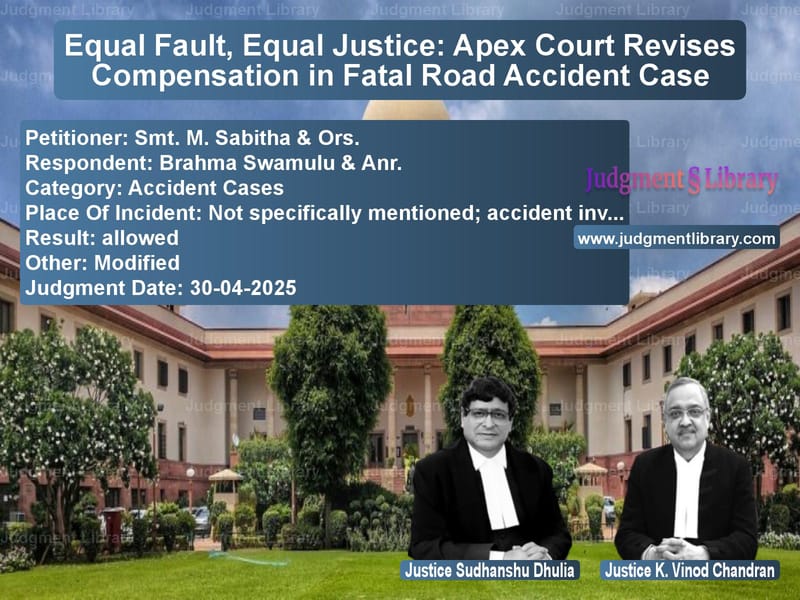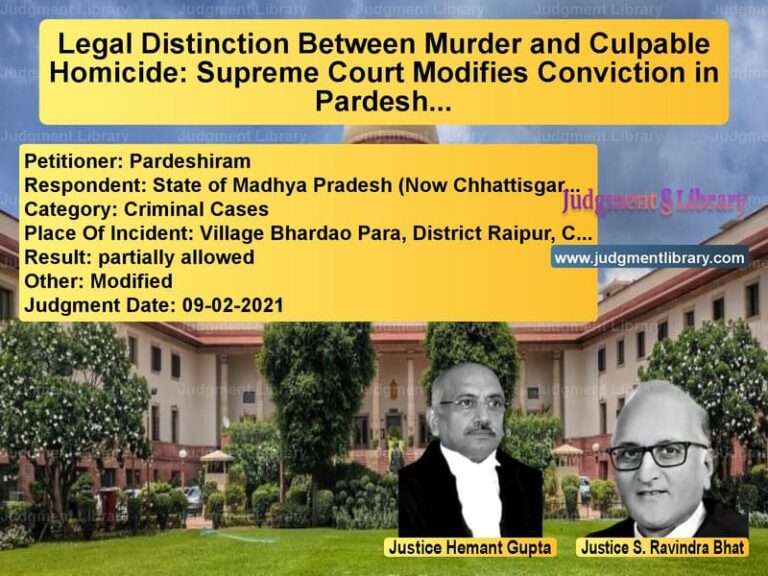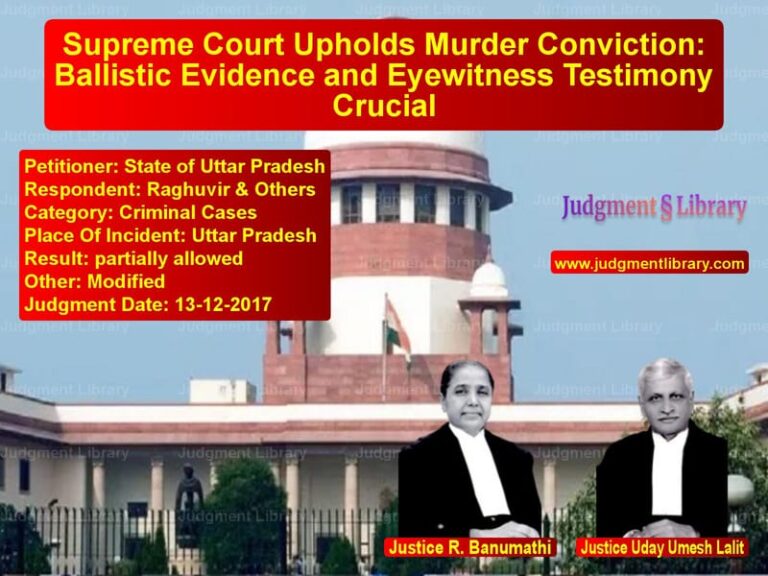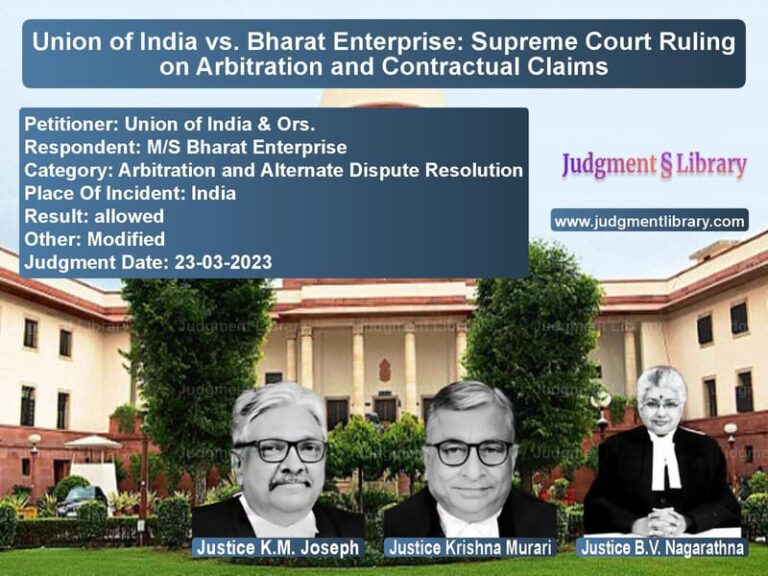Equal Fault, Equal Justice: Apex Court Revises Compensation in Fatal Road Accident Case
The tragic death of a car driver in a head-on collision with a speeding lorry raised crucial legal questions around negligence and rightful compensation. What initially seemed like a straightforward case of fault turned into a legal battle that required the highest court’s intervention to correct the course of justice. The Supreme Court’s recent judgment in the case of Smt. M. Sabitha & Others versus Brahma Swamulu & Another has reaffirmed how critical it is to look beyond preliminary police reports and give due weight to actual evidence, especially when it comes to determining contributory negligence and awarding just compensation to the family of the deceased.
Background of the Case
The case began with an unfortunate accident where the husband of the appellant, while driving a car, collided head-on with a lorry. The impact was so severe that it resulted in his instant death. The accident led to a police FIR being filed against the deceased car driver. Subsequently, the case was closed, stating that the accused (the car driver) was no more. This conclusion formed the basis for the Motor Accident Claims Tribunal to rule that the accident occurred due to the negligence of the deceased, awarding a meagre compensation of ₹50,000 under Section 140 of the Motor Vehicles Act, 1988.
High Court Observations
However, when the matter went to the High Court, it examined the sketch of the accident site (Exhibit B-5) and noted that both the car and the lorry drivers were negligent. The sketch indicated that the deceased was overtaking another vehicle when the collision occurred, and the lorry coming from the opposite direction was also being driven recklessly. The High Court determined that the deceased car driver was 70% at fault, thereby assigning only 30% liability to the lorry driver.
Petitioners’ Argument
Unhappy with this decision, the claimants (wife, children, and mother of the deceased) approached the Supreme Court, challenging the finding of 70% contributory negligence. They contended that:
“The FIR was lodged based solely on the statement of the lorry driver, who was an interested party and not a neutral witness.”
They further argued that:
“No investigation was carried out by the police and no independent witness was examined. The statement made under Section 161 CrPC by PW-1 (the wife of the deceased), was not based on personal observation and was unreliable as the eyewitness was not produced.”
Respondents’ Argument
The lorry driver and insurer had maintained that the car driver was overtaking and thereby negligent. However, they did not counter the allegations of high speed and failure to prevent or reduce the impact by applying brakes or evasive measures.
Supreme Court’s Findings
The Supreme Court observed that the negligence had to be determined based on evidence and not merely on police records. The bench pointed out the following:
“Obviously, no reliance can be placed on such FIR to find negligence on the driver of the car.”
The Court found that the High Court had itself acknowledged that the car was overtaking, and the lorry was coming from the opposite direction at high speed, which dragged the car nearly 20 feet after the impact. Based on this, the Court concluded:
“We are hence inclined to find that the contributory negligence on the drivers will be equal, since there is fault on the part of the car driver in not taking sufficient care when overtaking, while the impact could have been avoided or gravity lessened, if the lorry had been driven in normal speed. Hence, apportionment of liability can be fixed at 50% for each.”
Revised Compensation Calculation
The Court adopted the deceased’s annual income based on his Income Tax Returns at ₹4,50,000 and added 40% towards future prospects. A deduction of 25% was made for personal expenses. The applicable multiplier for a 38-year-old was fixed at 15. The court also referred to the precedent laid in New India Assurance Company v. Somwati & Ors. (2020) 9 SCC 644 to award consortium for all dependents.
The final computation was as follows:
Loss of dependency: ₹70,87,500
Loss of consortium: ₹40,000 × 4 = ₹1,60,000
Loss of estate: ₹15,000
Funeral expenses: ₹15,000
Total Compensation: ₹72,77,500
After factoring 50% contributory negligence, the awarded compensation stood at ₹36,38,750 with interest at 7% per annum from the date of claim petition, with deduction of interim compensation already paid.
Final Verdict
Allowing the appeal, the Supreme Court declared:
“The appeal stands allowed with the above modification.”
The ruling not only delivered fair compensation to the grieving family but also corrected the flawed reliance on one-sided police records and hearsay statements to determine fault in road accident cases.
Conclusion
This judgment serves as a significant precedent in accident compensation law. It reinforces the importance of objective assessment of all facts and evidence, especially in fatal motor accident claims. The decision will likely shape how contributory negligence is calculated in future cases, urging tribunals and High Courts to base findings on credible, corroborated evidence instead of sole reliance on FIRs or statements made under Section 161 of CrPC. Justice in such cases must be restorative and compensatory—not a mere formality dictated by procedural shortcuts.
Petitioner Name: Smt. M. Sabitha & Ors..Respondent Name: Brahma Swamulu & Anr..Judgment By: Justice Sudhanshu Dhulia, Justice K. Vinod Chandran.Place Of Incident: Not specifically mentioned; accident involving a car and a lorry.Judgment Date: 30-04-2025.Result: allowed.
Don’t miss out on the full details! Download the complete judgment in PDF format below and gain valuable insights instantly!
Download Judgment: smt.-m.-sabitha-&-or-vs-brahma-swamulu-&-anr-supreme-court-of-india-judgment-dated-30-04-2025.pdf
Directly Download Judgment: Directly download this Judgment
See all petitions in Compensation Disputes
See all petitions in Motor Vehicle Act
See all petitions in Negligence Claims
See all petitions in Judgment by Sudhanshu Dhulia
See all petitions in Judgment by K. Vinod Chandran
See all petitions in allowed
See all petitions in Modified
See all petitions in supreme court of India judgments April 2025
See all petitions in 2025 judgments
See all posts in Accident Cases Category
See all allowed petitions in Accident Cases Category
See all Dismissed petitions in Accident Cases Category
See all partially allowed petitions in Accident Cases Category







